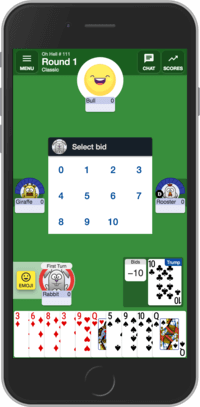Overview
Oh Hell is a trick taking game where players try to win the exact number of tricks they bid; it may sound simple, but the game requires a strong strategy! Oh Hell can be played by 3 to 12 players.
The card game first appeared in New York and London in the 1930's and since then has become popular all over the world.
Ranking of Cards
In Oh Hell, Aces are high and 2s are low.
Summary
- The players bid on how many tricks they can take during the round. The aim of the game is to take exactly the number of tricks bid, no more and no less
- The size of the hand decreases each round from 10 to 1 then increases each round to 10 again, where the game ends
- If the player bids the correct amount of tricks won, they receive a bonus 10 points as well as the number which they had bid. For example, if a player takes 2 tricks and had bid 2 tricks originally, they will receive 10 + 2 = 12 points
Presets
- Solo: An individual plays against the other players
- Teams: Teams of two play against each other. Teammates share their bid and tricks won for the round
Play Multiplayer Oh Hell! Online
The Deck and the Deal
Oh Hell is played with a standard deck of 52 cards. For round 1, the dealer passes out 10 cards, one by one, face down to each player. The trump suit for the round is then established by turning over the next card in the deck. Depending on the number of cards passed and the number of players, there might be several cards that are out of play.
How to Play
Going clockwise, players announce how many bids they believe they will win in the round. Players cannot pass but can bid 0. After announcing their bids, gameplay begins with the player left of the dealer. This player leads the trick with whatever card they choose. Going clockwise, players must follow the lead suit if possible. After everyone plays into the trick, the player with the highest card in the lead suit (or trump suit) wins the trick. The winner of the trick leads the next trick.
Play continues until everyone has played all of their cards. Points are then tallied for round 1. Afterwards, the cards are shuffled, the dealer position rotates clockwise, and the new dealer begins round 2 by passing out 9 cards. Gameplay continues like in round 1. With each round, the number of cards dealt decrease by 1 until there is only 1 card dealt. After 1 card is dealt, the number of cards dealt increases by 1 until there are 10 cards dealt again. Gameplay then stops and final points are tallied.
Scoring
Players receive 1 point for every trick won. If a player wins the exact number of tricks they bid on, they receive an extra 10 points bonus for the trick.
Winning
After 19 rounds, final points are tallied. The player with the highest number of points wins the game.
Variations
CardzMania supports several customizable rules and options so you can play Oh Hell! exactly how you like or how you grew up playing with your friends and family. In addition to the classic way of playing, we often have new creative options for you to try to spice up the game if you are interested in trying different spins for fun.
Rounds
Players determine a set amount of rounds (also known as hands or deals) that the game will go to (instead of the points selection above).
Timer
Players only have a set amount of time to make their turn after which a turn is automatically played for them and the game proceeds: Fast is 7 seconds, Standard is 15 seconds, Slow is 30 seconds, and Very Slow is 60 seconds. Players can also choose to disable the timer, but that is only for private tables.
Hook
When activated, the dealer cannot place a bid that would make the total bids equal to the number of cards dealt in the round. With hook enabled, at-least one person will not be able to successfully complete their bid.
Closed Bidding
When activated, bidding will happen simultaneously, staying anonymous until all bids have been placed. When switched off, bidding will happen in a turn-based manner, with the bids available for other players to see and use that information to smartly make your own bid .
Maximum cards dealt
Players can determine the maximum number of cards dealt in three ways: a default setting (10 cards for 5 players or less, 8 cards for 6 players and 7 cards for 7 players), a blanket standard of seven cards, or the maximum possible cards dealt using all cards from the deck.
Minimum cards dealt
Players can determine the minimum number of cards dealt. The options for this variation are 1, 2, 3, and 4
Fixed Trump
When activated, trump suits will be determined in a fixed pattern for each round. The choices are Spades, Diamonds, Clubs then Hearts (SDCH); Clubs, Diamonds, Hearts then Spades (CDHS); or Clubs, Diamonds, Hearts, Spades then No Trump (CDHSN); or Spades, Diamonds, Clubs, Hearts then No Trump (SDCHN); or always Spades. If not activated, trump suits will be selected by drawing the next card from the deck after all hands have been dealt for that round.
Successful Bid
Players can alter the points awarded for when a non-zero trick bid is successful. The default is 10 + Bid. Alternative options are: 10 x Bid; 10 + Bid²; 10 + 2 x Bid; 10 + 3 x Bid; 5 + Bid, 1 + Bid, Bid, 10 + Triangle Number (Bid x (Bid +1) / 2).
Successful Zero Bid
Players can alter the points awarded for when a zero trick bid is successful. The default is 10. Alternative options are: 5; 1; 0; 5 + Cards; 10 + Cards.
Double when All
When activated, players are awarded double points for a successful trick bid that is equal to the number of cards dealt that round.
Too Many
You can alter the points deducted for an unsuccessful trick bid for when the tricks were too many. The default is Taken. Alternative options are: Zero, Bid - Taken, 2 x (Bid - Taken), 3 x (Bid - Taken), 10 x (Bid - Taken), -(Bid - Taken)², -Taken.
Too Few
You can alter the points deducted for an unsuccessful trick bid for when the tricks were too few. The default is Taken. Alternative options are: Zero, Taken - Bid, 2 x (Taken - Bid), 3 x (Taken - Bid), 10 x (Taken - Bid), -(Taken - Bid)², -Bid.
Dealing Order
After you have established the Maximum and Minimum amount of cards to be dealt (see above in 'Maximum Cards Dealt' and 'Minimum Cards Dealt'), you can alter the amount of cards dealt in each round. The default Dealing Order starts at Maximum, descends to 1 card, then ascends to the Maximum. Alternative options are: Min..Max..Min, Max..Min, Min..Max, Max..Min..Max..Min, or Max.
Lead trump
By default, you can lead trump anytime on a trick. Alternatively, you can restrict trumps to be only lead after they are broken (somebody trumps an existing non-trump trick); after the first trick; after three tricks; after three tricks or broken. If your hand consists of only trumps, then this doesn't matter.
Must trump
With this option enabled, you must trump the trick if you are void in the ongoing trick suit.
Must win
With this option enabled, you must win the trick if you are eable to do so (play higher than the winning card, or if void in the trick suit, must trump the trick).
Double deck
Players can choose to play with a double deck and also control the cards being used from the second deck. Options include low cards (2-6) when needed (more than seven players); Full deck when needed (more than seven players); Full deck always.
First card wins
When playing with two decks and the same card is played, this option controls whether the first card or the second card wins the trick.
Highest bidder leads
Instead of beginning with the player left of the dealer, the first player to lead the trick is the person with the highest bid.
No trump rounds
Players can determine which rounds will not have a trump suit. This option only works with the dealing order Min..Max..Min. Options include one no trump round at max (Min..Max,NT,Max..Min); no trump rounds for each player at max (Min..Max,NT..NT,Max..Min), no trump round whenever an ace is the turned over card; or no trump round whenever an ace or king is the turned over card.
Trick Basics
Trick Taking games center around having the highest ranked card in a draw. Typically, players of trick taking games sit in a circle, sometimes in teams and sometimes playing solo, and are dealt a hand of cards. Given the specific game's card ranking (and trump - special suit that beats other suits), players draw a card from their hand in hopes that it outranks the other cards played. The player who outranks the others wins the trick for that round and gameplay is repeated until the cards are exhausted. Typically the player or team with the most tricks wins the game.
In a trick, each player plays a single card. One player is selected to start, then play proceeds clockwise around the table. If possible, players must play a card which is the same suit as the first card played - this is called 'following suit'. If a player cannot follow suit, then they may play any card in their hand. Based on the cards played, one player is declared the winner of the trick, usually for playing the highest value card of the trump suit, or of the suit of the card which started the trick.
After all cards have been dealt, normal trick taking commences. Remember all cards of the suit declared as trump (trump cards) beats any other suit. Whichever team wins seven tricks out of thirteen wins the round, winning all thirteen tricks is referred to as court. If the dealers team achieves this feat, its called a goon court. In single sir, winning the first seven consecutive tricks constitutes a court.
After cards dealt, depending on the trump, you have to figure out your strategy for the game whether to play trump first or not. In single sir / single sar winning the first seven tricks constitutes as a court or a goon court, so the strategy is very different than double sir / double sar. Whichever team (dealers team or trump callers team) wins seven tricks wins the deal and the opposing team becomes the dealer. In double sir, you have to win two consecutive tricks, so the strategy is totally different as you need to keep another high card to win the pile. Note that the second and the second last trick cannot be won, so you have to be extra careful about that too. This game is played in many variations so you have to be extra careful about the rules.
Based on the cards played, one player is declared the winner of the trick, usually for playing the highest value card of the trump suit, or of the suit of the card which started the trick.
Hand
The cards that a player is dealt forms their hand. Each round, a player selects one of the cards in their hand and plays them into the pile. In most trick taking games, all players are dealt the same number of cards and the hand is hidden from the other players, but in some games, like 500, a player can reveal their hand for bonus points.
Pile
The pile is the spot where players place their chosen card for the round. The player with the highest ranked card receives all of the cards in the pile and sets them to the side. In most trick taking games, the individual cards in the pile have a specific point value that is given to the winner.
Dealer
The dealer is chosen at random and passes out the deck of cards to form each player's hand. In most games, the dealer position rotates to the left once the deck needs to be re-shuffled and re-dealt.
Trump
Arguably the most important part of any trick taking game, the trump suit is the highest ranked suit in the game. Every game has its own method of selecting trump. Some games leave the selection up to the winner of the bid while some games make the suit of the lead card the trump suit.
Order
The ranking of the cards is dependent on the game. Ace is usually considered the highest in trick games, but some games from Europe, like Klaverjassen, have the Jack of trump the highest card.
Auction/Bidding
Most trick taking games contain an auctioning/bidding phase at the beginning of gameplay. During this time, players take turns bidding how many tricks they expect to win in the game. The player with the highest bid leads the first trick and decides the trump suit in most games. Often times, if the winner of the bid, sometimes called the declarer, fails to win the amount of tricks they bidded, they receive a lot of penalty points
Lead Card
The Lead card is the first card in the trick. In most trick taking games, subsequent players need to play the suit of the lead card if they can.
Card Game Basics
A deck of cards consists of 52 cards, with 4 distinctive subgroups. Each of these subgroups is recognised by a symbol and are referred to as suits. They consist of Clubs, Spades, Hearts and Diamonds. Each suit contains 13 cards which, generally, are considered in this order, Ace (A), 2, 3, 4, 5, 6, 7, 8, 9, 10, Jacks (J), Queen (Q) and King (K). Some games include the two Jokers found in a standard deck but most games don't.
Feedback
Would like to discuss new features or variations for Oh Hell!? Need a custom rule? Have a question? Got a suggestion? Don't see a game you want to play? Please contact us by
email, facebook or twitter - we really value your feedback and love hearing from all of you!
This site uses cookies. By continuing to browse the site you are agreeing to our use of cookies.




